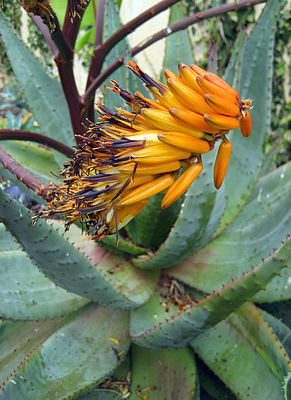Aloe marlothii
| Aloe marlothii | ||||||||||||
|---|---|---|---|---|---|---|---|---|---|---|---|---|

Aloe marlothii |
||||||||||||
| Systematics | ||||||||||||
|
||||||||||||
| Scientific name | ||||||||||||
| Aloe marlothii | ||||||||||||
| A. Berger |
Aloe marlothii is a species of aloes in the subfamily of the Affodilla family (Asphodeloideae). The specific epithet marlothii honors the German botanist and pharmacist Rudolf Marloth (1855–1931).
description
Vegetative characteristics
Aloe marlothii grows easily and in a stem-forming manner. The upright trunk reaches a length of up to 4 meters (rarely up to 6 meters) and is covered with dead leaves. The 40 to 50 lanceolate, narrowed leaves form dense rosettes . The cloudy gray-green to blue leaf blade is 100 to 150 centimeters long and 20 to 25 centimeters wide. There are a few to many scattered, reddish-brown, 3 to 4 millimeter long spines on it. They are more numerous on the underside of the leaf. The piercing, reddish-brown teeth on the leaf margin are 3 to 4 millimeters long and 10 to 15 millimeters apart.
Inflorescences and flowers
The inflorescence consists of many branches and reaches a length of about 80 centimeters. The lower branches are branched again. The dense, horizontal to slightly crooked grapes consist of single-sided flowers and are 30 to 50 centimeters long and 5 to 6 centimeters wide. There are a total of 20 to 30 grapes. The egg-shaped to lanceolate-pointed, brownish bracts have a length of about 8 to 9 millimeters and are 5 millimeters wide. The orange to yellowish orange, club-shaped to bulbous flowers are on 5 millimeter long peduncles . The flowers are 30 to 35 millimeters long and rounded at their base. At the level of the ovary , the flowers have a diameter of about 7 millimeters. Above it they are expanded and finally narrowed to the mouth. Your outer tepals are not fused together over a length of 20 to 23 millimeters. The stamens and the style stick out about 15 millimeters from the flower.
genetics
The number of chromosomes is .
Systematics and distribution
Aloe marlothii is common in Mozambique , Botswana , South Africa and Swaziland .
The first description by Alwin Berger was published in 1905. The following taxa were included as a synonym in the species: Aloe ferox var. Xanthostachys A.Berger (1908, incorrect name ICBN -Article 11.4), Aloe ferox A.Berger (1908, nom. Illeg. ICBN -Article 53.1) and Aloe marlothii JM Wood (1912, nom. Illeg. ICBN -Article 53.1).
The following subspecies are distinguished:
- Aloe marlothii subsp. marlothii
- Aloe marlothii subsp. orientalis Glen & DSHardy
Aloe marlothii supsp. marlothii
The subspecies is distributed in Botswana, Mozambique, the South African provinces of KwaZulu-Natal , Gauteng , Mpumalanga , Limpopo and Northwest as well as Swaziland on rocky hills at altitudes of 1000 to 1800 meters. The following taxa were included as synonymous in the subspecies: Aloe supraleavis var. Hanburyi Baker (1896), Aloe spectabilis Reynolds (1927) and Aloe marlothii var. Bicolor Reynolds (1936).
Ronell Renett Klopper and Gideon Francois Smith recognized Aloe spectabilis again in 2010 .
Aloe marlothii subsp. orientalis
The differences to Aloe marlothii subsp. marlothii are: The variety often sprouts and forms clumps. Their upright or prostrate to crooked trunks are up to 1.75 meters long. There are few or no spines on the leaf surface. The flower clusters on the inflorescence are crooked.
The first description of the subspecies by Hugh Francis Glen and David Spencer Hardy was published in 1987. Aloe marlothii subsp. orientalis is distributed in the extreme south of Mozambique, in the South African province of KwaZulu-Natal and in Swaziland on sandy soil at heights of 15 to 500 meters.
proof
literature
- Susan Carter , John J. Lavranos , Leonard E. Newton , Colin C. Walker : Aloes. The definitive guide . Kew Publishing, Royal Botanic Gardens, Kew 2011, ISBN 978-1-84246-439-7 , pp. 678-679 .
- Leonard Eric Newton: Aloe marlothii . In: Urs Eggli (Hrsg.): Succulent lexicon. Monocotyledons . Eugen Ulmer, Stuttgart 2001, ISBN 3-8001-3662-7 , pp. 156 .
Individual evidence
- ↑ Urs Eggli, Leonard E. Newton: Etymological Dictionary of Succulent Plant Names . Springer, Berlin / Heidelberg 2010, ISBN 978-3-642-05597-3 , p. 148.
- ↑ Alwin Berger: About the systematic structure of the genus Aloe . In: Botanical yearbooks for systematics, plant history and plant geography . Volume 38, Number 1, 1905, p. 87 ( online ).
- ^ Gilbert Westacott Reynolds: Journal of South African Botany . Volume 2, number 1, Kirstenbosch 1936, p. 34.
- ^ Ronell Renett Klopper, Gideon Francois Smith: Asphodelaceae: Alooideae: Reinstatement of Aloe spectabilis . In: Bothalia . Volume 40, number 1, 2010, pp. 91–93 ( PDF )
- ^ Flowering Plants of Africa . Volume 49, Numbers 3-4, 1987, panel 1943.
Web links
- Aloe marlothii subsp. marlothii in the Red List of South African Plants
- Aloe marlothii subsp. orientalis in the Red List of South African Plants
- Aloe spectabilis in the Red List of South African Plants

